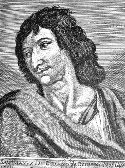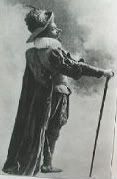
And so it went, back and forth across the room, faster and faster, swords blurring, crossing with a sound like a percussionist’s triangle jangled by a madman; only the occasional minor touché was effected, with d’Artagnan getting a few shallow cuts on his upper right arm, Cyrano taking one one just above a nostril, so that blood ran into his mouth, and a scratch over the collarbone; but, equally matched, neither swordsman gained significant ground.
The two duelists became heated, the hilts of the flashing swords slippery with sweat, their eyes glittering like their sword-tips, their teeth bared with feral intensity. The fight was a curious wedding of tactical keenness and competitive animal fury.
After a particularly furious exchange of sharp steel, d’Artagnan stepped back into one of the tables holding a candelabra, rocking it so that the candle holder fell onto the floor, near a tapestry.
“Arrete!” d’Artagnan cried, and Cyrano nodded, stepped back, to give him a moment to smother the flames.
As d’Artagnan succeeded at this, Alcandre slipped from the shadows and hissed, “Cyrano! Now you fool—while his back is turned!”
Cyrano whirled on him with narrowed eyes, shaking with the affront of it. “What do you think I am!”
“Merci, Cyrano,” d’Artagnon said, turning away from the ashes, the fire now smothered.
“And now…” He performed his salut, Cyrano returned it, and poised to fight…
But just then the door to the inner room opened and a sleepy, rumpled young sovereign stood there in his silk nightshirt and bare feet, scratching himself. “See here, guards, where is d’Artagnan, he is to sit beside my bed! And what was that great crash that…” Then he stared, blinking, at Cyrano, realizing this was not one of his guards. “But who is this? What has occasioned here?”
The Count d’Artagnan turned instinctively to the young king. “Your Majesty! Go back into the other room and bar the door! I will protect—”
He did not finish the sentence, for the sorcerer had stepped up behind d’Artagnan, and struck him from behind with the fallen candelabra.
And Charles d’Artagnan crumpled to his knees, badly stunned.
“What!” Cyrano cried, outraged. “That is carton noir! It is not done, magician! We were engaged in combat between gentlemen!”
“Gentlemen? He is a murderous hireling of that Italian bastard Mazarin—and this pallid little tyrant!”
“Who’s a tyrant?” asked the young king, blinking in confusion. “And what have you done to my friend! d’Artagnan is quite dazed! Guards!”
“Kill him, Cyrano, before he brings the palace down upon us!” the Magician urged.
But Cyrano, gazing at the young man, felt some of the fog that had blurred his mind evaporate. “But—that is my king! This is Louis! The Fourteenth Louis! He is but a boy!”
“Mazarin is to die soon enough—and this boy will take full command of the nation! He will bring upon it wars and poverty! Do you not remember what I showed you?”
Cyrano remembered—as they’d traveled to this place, he’d seen, away in a metaphysical distance, the raveling and unraveling of time: he’d seen the building of Versailles, the self indulgent glories of the court, and the wars—the Wars of Devolution, the Dutch War, the War of the League of Augsburg, the War of the Spanish Succession…
“Guards!” Louis shouted.
“Kill the tyrant!” urged the magician. “And you will not be struck down! You will live, Cyrano! Refuse and I will return you to your fate!”
d’Artagnan struggled to rise, blood rising from his head. “No…the king…”
“Odd,” Cyrano remarked. “'Struck down' did you say? The worthy d’Artagnan is here struck down, struck on the head by a foul blow—just as I was to be. Such strokes are the signature of villainy! They are struck off by the same diabolical hand! I believe it was you, sir, who paid to have me assassinated with a block of wood—so that you could manipulate me to your villainy!” The sorcerer’s scowl deepened; his eyes flicked. He did not deny it. Cyrano went on, “No, Magus—I am no marionetted believer in the monarchy, and I am not a floundering abaser before the Church. But I know duty when I see it and I know the diabolic when I smell it! And who is better equipped to smell it? No, sir Magus—my eyes are opened! You spoke of some distant tyrant but this is the monarch accepted, for better or worse, by the people of France! It is to them I defer—not the crown. Why should I kill King Louis? And why do you wish it done?”
“Why—in a few years, when he is grown a man he will cleave closer to the church, which will send its agents to hound me, to destroy me! I have seen it! It must be stopped! I will not be persecuted! I have used all my magic to this end! And as for you—kill him…or die yourself, Cyrano!”
“I refuse! He is not even armed! Am I to strike down a youth in his nightshirt? Am I a slinking footpad? No! The fight with my esteemed opponent has cleared my head of your dire influence… Again—no! I will not strike him down!”
The young king looked back and forth between them, puzzled, on the verge of shouting for help again—but falling under the magician’s mesmeric influence himself.
“Kill him, Cyrano!” Alcandre persisted. “—and I will give you your Roxanne! She will love you as you always dreamed she would!” the magician crowed, leering. “I will use my magic to bend her will to you!”
“Dog!” Cyrano burst out, scarcely believing his ears. “You expect me to insult her by despoiling her will—her very being? Never!”
“Then, Cyrano, you will die, and—but wait!” The magician’s gaze had fixed on the confused young king. “He is not wearing the charm!”
“The charm?” Louis muttered dreamily, his hand going to his throat. “It was uncomfortable to sleep with, an angular thing that woke me when I rolled on it, I put it aside—do you mean that it was truly…?”
“Gone!” Alcandre cried. “And I am free to strike him down myself!” He drew a dagger from under his bottle-green coat and lunged at the boy, who shrank back gasping…
Then the sorcerer gave a cry, as Cyrano’s epee flashed, and drove through the Magician’s ribcage from the side, to pierce both his lungs.
Skewered, the Magus stood there quivering, mouth agape, eyes wide with surprise, until the dagger fell from his hand. He followed it to the floor, slipping from Cyrano’s blade as he fell dying, bleeding copiously on the glossy marble.
“You…!” the magician rasped. “You, Cyrano…will die as fated…the oaken beam will fall on your head…for without my will holding you…holding you here…you will be removed to your destined place… In killing me—you doom yourself!”
“So be it!” Cyrano said. He turned to help d’Artagnan to his feet. “Monsieur, forgive me.” He turned to the king and doffed his hat. “Your majesty—I apologize for this disturbance. I…”
He was unable to finish the apology. The room containing the Musketeer, the magician and the King began to recede from him—like a transparent box dropped from a high battlement, to fall away, to spin, to smash into pieces.
And Cyrano, no longer held by the will of the magician, was drawn back; was gripped by destiny and pulled inexorably back to that October, that Saturday, that rain-wet narrow, cobbled street, outside the tenement in which he lived. Back to Ragueneau and that hurtling wooden beam…
He appeared on the street—the beam fell.
But he had forewarning, and there was just a split second in which he was able to move slightly to one side…
The beam struck him. Yet it struck his head more glancingly than it would have, had he not been forewarned. He gave a grunt and fell, flailing, into the street, driven senseless, thinking himself flying headlong into the arms of Death.

Cyrano woke a short time later lying, fully dressed, on his own humble bed. He was aware that some potion for the muting of pain had been forced between his lips, that bandages swathed his head. Waves of pain, dulled but unrelenting, rolled through him from the left side of his head. His vision was haloed, and dim. But he was still alive…for a time.
The doctor, talking in low tones to Ragueneau, confirmed Cyrano’s suspicions.
“He is in all probability dying. There is nothing more I can do. Who knows? If he remains in bed, perhaps there is some slight chance of recovery. If he rises…no. Even if he lies quietly, I can hold out little hope…Now, sir, I have no more time for charity cases—I must go.”
The doctor departed, and Cyrano closed his eyes. He heard Ragueneau speak to him. “Cyrano—I am going to find our friends. Perhaps we can combine our purses and bring another surgeon. Soup, at least—you have nothing to eat here. I will be back soon! Do you hear me, Cyrano?”
“Yes…yes my friend…my good friend…” Cyrano managed, through cracked lips. “How strange it was—I swear to you, I was carried off by a magician, who wanted me to assassinate the king. If I did the deed, I might live. But…I could not bring myself to do it. Thank heaven d’Artagnan was there to slow me, till my mind cleared, and…and I knew…”
“Indeed? Yes, Cyrano, it was well that he was there.” Clearly Ragueneau did not believe Cyrano. Incredulity was stark in his tone.
Cyrano wasted no more time on the tale. He had told many fantastic tales—his friend would conclude this was another, formed in delirium. “I must go to Roxanne…her gazette…I must see her again. Before the Old Fellow comes for me. I must….”
“No, Cyrano! You heard the doctor—you must not move! Do not stir! I will return!”
Then Ragueneau departed. Cyrano felt sick, caved-in within himself. But after a few minutes he managed to turn on the bed. In another minute, he was able to sit, and reach for his old cane. In another, to stand, leaning on the cane…
“She waits for me…Roxanne waits…”
And Cyrano staggered to the door.

At the funeral in the chapel of Our Lady of the Cross, the Count d’Artagnan gazed upon the face, the grotesque and noble face, of Cyrano Hercule-Savinien de Bergerac. Cyrano lay in his coffin, dressed in borrowed finery.
The Count d’Artagnan was pondering on a strange dream that had troubled him the night before. In the dream, he had been asked to protect King Louis against a feared, unknown assassin. To his surprise, Cyrano had appeared at the door of the King’s bedchamber…and with him was a disagreeable little man in green, who seemed to be a magician. d’Artagnan had the curious impression that the magician had somehow been directing Cyrano, with a combination of guile and will. The magician had threatened to send Cyrano back in time to an appointment with destiny, and death—a falling beam of wood was mentioned. The oaken beam will fall on your head…
And then this morning, d’Artagnan had been told by Le Bret that the man who’d fought so bravely at the Siege of Arras was dead. That he had been badly concussed by a falling beam of wood, but might have survived had he not insisted on keeping a date with a woman he had loved, chastely loved, for many years…
That Cyrano had died, in her arms, in the garden of the Ladies of the Cross.
Strange! The concordance of dream and real events. Could it be that in some future time he would in truth have to duel with Cyrano—who now lay dead before him?
Preposterous. And yet…
“Monsieur d’Artagnan!” called Ragueneau, joining him beside the open coffin. “Ah—how sad he looks!”
“And how is the Madame Robin—the lady Roxanne?”
“She has done her weeping, and now kneels praying for him at a shrine, just outside, where together they sometimes walked. She insists she feels him near her.”
“Perhaps—he was a great soul. I did not like his politics—but what a man!”
“Ah, to think I outlived Cyrano! An injustice. Only yesterday I read his Agrippine again. In it, you know, he said, one hour after death our vanished soul will be that which it was an hour before life. Yet I cannot but think that his soul will go on…journeying through time.”
“Through time?” d’Artagnan was startled by Ragueneau’s choice of words. The dream still weighed upon him.
“And it’s a most peculiar thing, monsieur,” Ragueneau continued, bemused. “But as I approached Cyrano, yesterday morning, just before that chunk of wood struck him, why—I seemed to see him vanish! To completely, vanish, for a moment! It was as if God thought, 'No, I cannot let this great man die thus!' and snatched him away. And then God decided, 'But then, I cannot change the rules of destiny for him alone!' And so, a moment later, he restored him…Cyrano reappeared, and was struck down! Well. Doubtless a trick of the light.”
“Yes. Yes doubtless…”
A young man entered the chapel—the son of one Duke de Guiche. Resplendently dressed in velvets, jewels and silk, he swaggered in, a flagon in his hand, a jeweled sword at his side. He wore a broad gold-stitched hat with a white flourishing plume. He was quite evidently drunk.
“So!” brayed the young de Guiche. “This is the famous Cyrano! I drink to him! But look—that nose—how will they get the coffin lid shut on that nose, eh? They shall have to crop nose or rebuild the lid! Ha haa!”
“Imbecile!” snarled d’Artagnan, drawing his sword. “Apologize—or die!” He flicked the sword, and–snip!—de Guiche’s plume fell, cut in two, to the floor.
The young nobleman squeaked in fear, and backed away—he fumbled at his sword, then thought better of it, and threw the flagon clumsily at d’Artagnan. Then he ran like a rabbit from the room.
Whereupon the Count Charles d’Artagnan turned to the coffin of Cyrano de Bergerac. He bowed his head. And d’Artagnan wept.



No comments:
Post a Comment